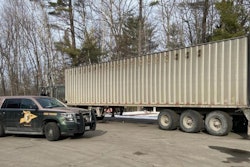The Federal Motor Carrier Safety Administration is delaying the implementation of a federal rule establishing, for the first time, training standards for entry-level truck drivers.
The Entry-Level Driver Training (ELDT) rule was slated to take effect in just over a week — Feb. 7, 2020.
It will now take effect Feb. 7, 2022, with FMCSA preparing to file a notice in the Federal Register in the coming days to announce the new compliance date.

The agency will accept public comments on the delay for 45 days after it is published in the Federal Register.
The rule was finalized in early 2017, providing a three-year window before it took effect to allow FMCSA, trainers, fleets and states time to implement the necessary systems and procedures. The delay will give stakeholders two additional years to prepare
The rule only applies to CDL applicants who receive their licenses after the rule’s effective date.
Required training in the rule – both classroom and behind-the-wheel driving – includes the basic operation of a vehicle, vehicle control systems and dashboard instruments, pre- and post-trip inspections, backing and docking, distracted driving, roadside inspections, hours of service, driver-whistleblower protections and procedures, and more.
The rule requires training to be completed by an FMCSA-approved provider from the Training Provider Registry established by the rule, which remains at this date a work in progress.
For fleets to provide training to entry-level drivers, they must be in the registry and comply with the rule’s required curriculum.
Don Lefeve, head of the Commercial Vehicle Training Association, said the group is frustrated by the delay, noting that the rule is already years late on the statutory deadline set in 2012 by Congress, who called for the rule to be made final within three years. “The ball has been dropped,” he said. But, he adds, “I feel like the leadership of FMCSA understands the significance of” the rule, “and I feel like they have a plan for moving forward.”
Professional Truck Driver Institute (PTDI) Executive Director Tim Blum said training providers (including fleets) should use the extra time to ensure their programs comply with the rule. “I look at this as an opportunity for the schools to get ready,” he said. “A lot don’t understand it, and a lot don’t even know about it. This is a period we can help people.”
The lynchpin for FMCSA, ultimately, will be the Training Provider Registry, which requires any CDL training organization to register, self-certifying that their program is compliant with the rule.
Looking at that crucial portion of what the rule requires, “we suspected a few years ago, ‘we’re not sure [the government] is going to pull that off’” in time, said Laura McMillan, vice president of training for Instructional Technologies, Inc. (ITI). McMillan added that since that time, she’d heard much about the difficulties/delays the government had experienced putting all of the technical pieces together, particularly as they relate to state agencies who are primary in the licensing process. With FMCSA‘s 2019 proposal to delay the two technical portions of the rule that essentially limited governments’ ability to enforce it, “they received a lot of comments [from state agencies] that requested a full delay.”
McMillan echoed Blum about schools’ preparations, which her organization supports with its online-training modules that can fulfill the theory portions of the newly required testing when the rule comes into play now in 2022. The ELDT rule, she said, mandates a professional certification, essentially, for any entry-level CDL driver.
“In our conversations with clients and others in the industry,” she said, “though they don’t necessarily like the idea of new rules and regulations, everyone can agree that’s really the right thing to do.” And regardless of how long it will take for the technical systems to support the newly required training to stand up, “none of that’s changing.”
–Matt Cole, Todd Dills, and James Jaillet contributed to this report.











